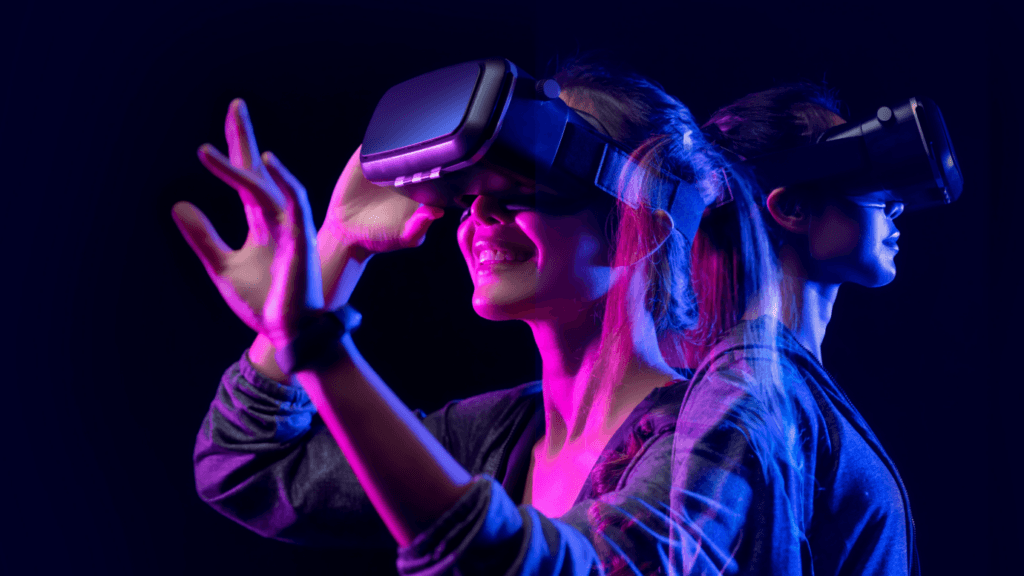Virtual Reality in Biotech, Pharma, and Healthcare Marketing

VR’s Untapped Potential
In an increasingly digital world, virtual reality (VR) is emerging as a groundbreaking tool across various industries. Its capacity to create immersive, interactive environments has transformed everything from gaming to education to real estate. However, its potential remains largely untapped in biotech, pharma, and healthcare marketing, where VR can be a game changer.
- As of 2023, there are 65.9 million VR users and 110.1 million AR users in the U.S.
- There are an estimated 171 million VR users worldwide.
This post explores the burgeoning role of VR in these sectors. We delve into what VR entails, how it’s already changing the marketing landscape in biotech and pharma, and what the future might hold for healthcare marketing. Join us as we uncover this innovative frontier.
Understanding VR
Virtual Reality, often simply referred to as VR, is a technology that creates a simulated environment. Unlike traditional user interfaces, VR places the user inside an experience, rather than merely viewing it on a screen. Users are immersed in a three-dimensional world that they can interact with in ways that mimic or even extend real-world possibilities.
The term VR is often used interchangeably with Augmented Reality (AR) and Mixed Reality (MR), but they represent distinct technologies on the reality-virtuality continuum. AR overlays digital information onto the real world, like Pokemon appearing in your living room through an app on your phone. MR, meanwhile, merges real and virtual worlds to create new environments where physical and digital objects co-exist and interact in real-time.
VR, however, provides a completely immersive experience. Through a VR headset, users can be transported to a simulated world that feels incredibly realistic. This technology offers unique value in industries like biotech, pharma, and healthcare, where explaining intricate concepts or showing the invisible is often necessary.
Applications of VR in Biotech and Pharma Marketing
Biotech and pharmaceutical companies often face the challenge of explaining complex products and processes to a wide array of stakeholders, from investors to physicians, and even to patients. Virtual Reality provides a unique platform to make these complex details comprehensible and engaging.
Product Demonstrations
Imagine showcasing a new drug and instead of presenting a slideshow, you invite your audience to journey inside the human body. They witness firsthand the drug interacting with cells, see the effect on the target receptors, and understand the mechanism of action as never before. This kind of immersive experience could revolutionize the way biotech and pharma companies launch and market products.
Explaining Complex Concepts
Biotech and pharma inherently deal with complex science that can be challenging for non-scientists to grasp. VR can simplify the explanation of these intricate concepts by providing visual and interactive experiences. Instead of reading about a biological process, one could watch it unfold in 3D or even participate in it.
Virtual Tours
For biotech companies especially, facility tours are a critical marketing tool, showcasing their advanced technologies and adherence to safety standards. However, on-site tours are not always feasible due to logistical constraints or biosecurity reasons. VR can step in to offer realistic, engaging virtual tours that potential partners or investors can take from anywhere in the world.
VR in Healthcare Marketing
Healthcare providers, like biotech and pharma companies, can leverage VR’s power of visualization and immersion. But the applications extend beyond marketing products or services to encompass patient education and experience, and even healthcare professional training.
Patient Education
VR can revolutionize the way healthcare providers educate patients about their diseases and treatments. Patients could see how their condition affects their body, how a proposed treatment works, and what to expect during the healing process. This could lead to increased understanding, reduced anxiety, and better patient outcomes.
Physician Training
VR can provide a safe and controlled environment for physicians and other healthcare professionals to practice procedures and handle complex cases. Marketing these training services could appeal to healthcare providers looking to improve their skills, reduce errors, and ultimately enhance patient care.
Patient Experience
Imagine a patient anxious about an upcoming hospital stay. A VR tour could familiarize them with the hospital environment, the team that will care for them, and the procedures they will undergo. This could greatly enhance patient satisfaction and result in more positive reviews and recommendations.
Benefits and Challenges
Virtual Reality offers a multitude of benefits for biotech, pharma, and healthcare marketing:
Increased Engagement: VR is an interactive medium that requires the user’s active participation, leading to higher engagement. When people can explore and interact with content, they are more likely to remember it and develop a positive association with the brand.
Memorable Experiences: VR creates memorable experiences. The sense of presence that VR provides helps create emotional connections and leaves a lasting impression, which can enhance brand recall and loyalty.
Better Understanding of Complex Concepts: The immersive nature of VR allows for the visualization of intricate processes or structures, which can be challenging to explain using traditional mediums. This could lead to better understanding and faster decision-making.
Despite these benefits, there are potential challenges to implementing VR:
Cost: Developing high-quality VR content can be expensive. Companies need to evaluate whether the potential benefits justify the costs.
Technology Adoption: While VR technology is becoming more prevalent, not everyone has access to the necessary hardware. This could limit the reach of VR-based marketing initiatives.
Creating Quality Content: Simply having a VR platform is not enough; the success of a VR campaign depends on the quality of the content. Developing engaging, informative, and visually appealing VR content requires a blend of technical and creative skills.

VR In Action
Several companies are already leveraging VR in their marketing initiatives. For instance, Novartis created a VR experience to educate health professionals about heart failure. Users could see and feel what it’s like to have heart failure, helping them better understand their patients’ experiences.
Johnson & Johnson, in partnership with Oculus, has developed VR training for surgeons and medical professionals. Their VR platform provides hands-on training and the ability to virtually practice procedures, proving a unique selling point for their medical devices.
An Exciting Frontier
The integration of VR in biotech, pharma, and healthcare marketing represents an exciting frontier. The unique capabilities of this technology — from creating immersive experiences to visualizing complex concepts — make it a powerful tool for connecting with and educating stakeholders.
While there are challenges to consider, the potential benefits are immense. Companies that successfully leverage VR can enhance their marketing initiatives, differentiate their brands, and drive growth.
As VR technology continues to evolve and become more accessible, we can expect to see even more innovative uses in these sectors. In the meantime, businesses looking to stay at the forefront of digital marketing should start exploring the potential of VR today.
emagineHealth is the digital-first, AI-powered agency for healthcare and life sciences. Let’s work together to maximize the results of your digital marketing initiatives.

Social Media for Healthcare & Biopharma
emagineHealth outlines the critical steps you can take now to show up on social media with a proven strategy to get your message across, reach your target audiences, and accomplish your social media goals.